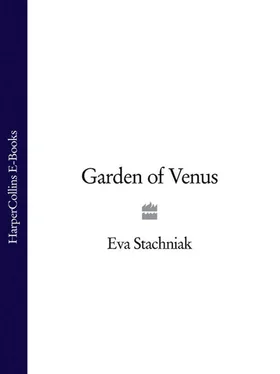Once she tells him that. Tells him how people seem to be the same everywhere, how the powerful are not as different from those who are beneath them. How men are really not that different from women, either.
‘Phanar,’ the internuncio says, ‘is the kingdom of busy-bodies, of chatterboxes feeding on any hint of scandal—the kingdom of calumny and hypocrisy.’
There is anger in his voice, impatience.
‘The world,’ he says, ‘is not what you imagine.’
She was born in exile, her father always said. Better than born in chains, for 1796, the year of her birth, was the first year there was no Poland on the map of Europe.
‘You saved your father’s life,’ her mother said. ‘Before you were born he spoke of nothing but death.’
In her father’s study, there was an engraving of Poland led to her grave. Polonia was a young woman in white, her hands chained. The grave was a square hole in the ground, and three men, Russia, Prussia, and Austria, were already holding the stone lid that would intern her. ‘But not forever,’ her father always said.
In 1795, at Maciejowice, defeated by the Russians in the last battle of the Insurrection, Tadeusz Ko?ciuszko, thinking himself dying, said: ‘Finis Poloniae.’
‘This is what we all feared then, Rosalia,’ her father continued. ‘But we were wrong.’ The soldiers in Napoleon’s Polish Legion had a reply to these words spoken in that black hour of defeat:
Jeszcze Polska nie umarla póki my Żyjemy
Co nam obca moc wydarla szabla odbierzemy
Poland is not dead as long as we are alive
What the foreign powers took away from us we shall regain by the sword
It was Napoleon Bonaparte, a man of iron will and a god of war, who had taught the Poles how to win. A god of war who had gathered the defeated Polish soldiers under his wing and gave them the chance to fight the enemies of their country. Bonaparte who would soon smash the might of the Russians and lead Poland out of her grave. Then there would be no more exile, no more rented rooms, no more packing and unpacking of trunks and crates. They would go back to Poland, to their manor house confiscated by the Russian Tsar because Jakub Romanowicz had refused to stop fighting for Poland’s freedom, had refused to live in slavery.
Rosalia loved when her father said that. She loved the way he smelled of snuff, the way his prickly cheeks chafed her lips.
‘Where is Poland now, Papa?’ she liked to ask, sitting down to a familiar ritual. Wherever they were—Paris, Rome, Livorno—his response was always the same. He would take her hand in his and place it on her chest.
‘Can you feel it?’ he would ask as her hand registered the rhythm of her heartbeat.
‘Yes,’ she would say, in her solemn, serious voice, waiting for what was coming.
‘This, Rosalia, is Poland.’
She believed him. She believed that Poland, this beautiful maiden entombed alive by Russia, Prussia and Austria would one day be resurrected. Like Jesus Christ, the Saviour, she would rise from the dead and lead the nations of Europe to a new world order. A just, wonderful world without wars, hatred and slaves. A world where it would not matter if you were a Pole, Jew, or a Cossack, a noble or a peasant, a merchant or a pauper for Poland, like a good mother would make room for them all.
‘I may not see it, Rosalia. You may not see it. But your children, or your children’s children will.’ Her father’s voice shimmered like pebbles in the stream. She imagined them, these faint generations yet unborn. Shadows waiting to come to being. Waiting for their time.
The girl from Galata must have bribed the Janissary the internuncio has placed at the entrance of the building, for three Greek furies—the girl and her two cousins—enter her bedroom when she is alone. They throw themselves upon her. They tear out clumps of her hair; scratch her face. She tries to defend herself, but the three of them are bigger and stronger. At one moment she almost manages to escape, but she trips over her own shoe and falls flat on the floor. With that same shoe her enemies beat her, leaving bruises all over her body. ‘He will turn away from you as he has turned away from me,’ the girl from Galata screams. ‘He will see how pretty you are with a black eye and scratches on your cheeks.’
They slash her dresses with razors. They smash the glass she keeps near her bed. They spit on her, on her bed, on the sheets folded neatly in the closet and smear it with something foul. Then they leave as suddenly as they have come. She hears their footsteps on the stairs, their braying laughter, their whistles of triumph. She gathers herself up, wipes the blood from her face, wraps herself in a blanket, and runs away to her mother.
The internuncio is shocked and very sorry. This is what his note says. He sends his own doctor to bleed her and clean the wounds. She has a fever and her body is rattled with shivers. ‘Tell my master,’ she says in a low whisper, ‘that I’ll die thinking of him.’
The doctor says she won’t die. ‘No one has ever died from a few scratches. Your bones are intact. You’ve just had a bad fright. Nothing more.’
Mana is sobbing in the corner, cursing her fate and her daughter’s misfortune. She doesn’t want to accuse anyone, but wouldn’t her daughter be safer within the Mission’s compound. Where she is now, anyone can find her. Only the other day someone came asking about a Greek girl called Sophie. A man with a red beard and shifty eyes. A sign that the Sultana has not forgotten.
By the time the internuncio comes to see her, it is already dark. The invalid is washed and bandaged, her breath is uneven, her forehead hot. ‘If she dies,’ Mana says, ‘I’ll never forgive myself.’
The internuncio is uneasy. He touches her forehead as a father might, checking how his daughter is feeling.
‘I thought I could trust you with my only child.’
‘Poor Dou-Dou,’ he says. In his voice there is something she could take for concern. When he raises the covers to check the bruises on her body, he is really looking at her.
He calls the doctor and takes him to another room. She can hear their raised voices, a barrage of questions followed by long explanations. When the two men emerge from the room, the internuncio smiles. To Mana he says that he will make sure Sophie gets the best of care. Two of his own servants will be at her disposal, day and night. She will have meals brought from his own kitchen.
‘Am I like Lais?’ she asks.
‘Only you won’t die,’ he tells her, holding her hand. ‘The doctor tells me you have a strong constitution. That it would take much more to kill you.’
She asks him to tell her about Poland.
He tells her of palaces with green lawns and hundreds of servants, hurrying around. Of carriages speeding through the streets, of balls where women of quality dance polonaises and mazurkas. Of tableaux vivants in which the court’s most beautiful ladies appear in the costumes of nymphs or muses.
What do they do?
Nothing. They pose as if a painter painted them. Let everyone admire their beauty. The themes of these tableaux often illustrate a saying or a proverb. Or an old story. Amor bending his golden locks over sleeping Psyche, Danae showered with golden rain.
She asks about the King. Do men tremble when they see him?
He laughs. In Poland, kings are elected and therefore weak. Their powers are limited by the golden freedom of the nobles. Liberum veto, he tells her. Remember that. It means that one Polish noble can stop the law, one Polish noble can break the Sejm for his own private reason. One Polish noble can oppose the king’s wish.
Читать дальше












